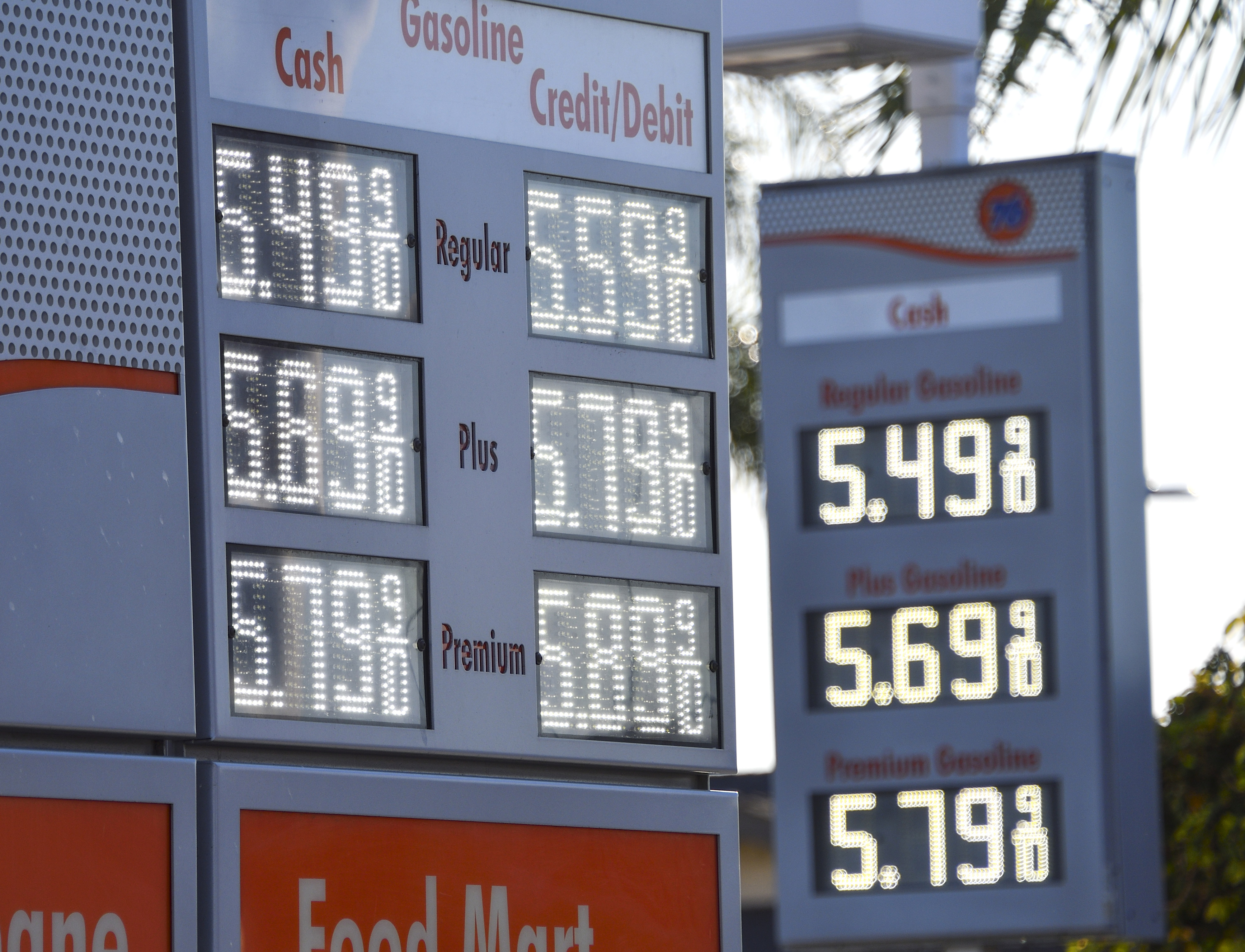As prices continue their daily climb across the country and in the Chicago area, many are wondering why prices are rising during Russia's war on Ukraine if the U.S. doesn't get much of its oil from Russia?
The price of regular gas broke $4 a gallon on Sunday for the first time in nearly 14 years and is now up nearly 50% from a year ago. Monday's national average of $4.104 per gallon broke a record for the all-time high, though that is not adjusted for inflation, according to GasBuddy.
The previous record was set in 2008, when prices averaged $4.103 per gallon. When adjusted for inflation, however, the record price would be equal to about $5.24.
Still, even that's a number some experts fear could be broken.
Feeling out of the loop? We'll catch you up on the Chicago news you need to know. Sign up for the weekly Chicago Catch-Up newsletter here.
“Americans have never seen gasoline prices this high, nor have we seen the pace of increases so fast and furious. That combination makes this situation all the more remarkable and intense, with crippling sanctions on Russia curbing their flow of oil, leading to the massive spike in the price of all fuels: gasoline, diesel, jet fuel and more,” Patrick De Haan, head of petroleum analysis at GasBuddy, said in a statement. “It’s a dire situation and won’t improve any time soon. The high prices are likely to stick around for not days or weeks, like they did in 2008, but months. GasBuddy now expects the yearly national average to rise to its highest ever recorded.”
Here's what we know so far and what you can expect:
Why are prices rising?
Prices at the pump were rising long before Russia invaded Ukraine and have spiraled faster since the start of the war.
Gas prices have been rising for weeks due to the conflict and in anticipation of potential sanctions on the Russian energy sector.
Even before the U.S. ban many Western energy companies including ExxonMobil and BP moved to cut ties with the Russia and limit imports. Shell, which purchased a shipment of Russian oil this weekend, apologized for the move on Tuesday amid international criticism and pledged to halt further purchases of Russian energy supplies. Preliminary data from the U.S. Energy Department shows imports of Russian crude dropped to zero in the last week in February.
Jesse Wheeler, a Morning Consult economic analyst, told NBC News that while "the U.S. largely produces sufficient quantities of crude for domestic consumption, oil is a global market."
"If global supply declines, the global price will increase," Wheeler said. "As global and U.S. crude prices increase, U.S. gas prices will also be driven higher."
Before the invasion, Russian oil and gas made up more than a third of government revenues. Global energy prices have surged after the invasion and have continued to rise despite coordinated releases of strategic reserves, making Russian exports even more lucrative.
How much oil does the US get from Russia?
The United States is the world's largest oil producer — ahead of Saudi Arabia and Russia — but it is also the biggest oil consumer, and it can't meet that staggering demand with domestic crude alone.
The U.S. imported 245 million barrels of oil from Russia last year — about 8% of all U.S. oil imports — up from 198 million barrels in 2020. That's less than the U.S. gets from Canada or Mexico but more than it imported last year from Saudi Arabia.
The increasingly violent Russian attack on Ukraine has increased calls to cut off Russia from the money it gets from oil and natural gas exports. Europe is heavily dependent on Russian gas.
Talk of a ban on Russian oil has led U.S. officials to consider other sources that are currently limited. In what was supposed to be a secret trip, senior U.S. officials traveled to Venezuela over the weekend to discuss the chance of easing oil sanctions on the major crude-exporting country.
How high could prices go?
De Haan said "forget the $4 per gallon mark," the nation is actually pushing closer to a national average of $4.50.
“We’ve never been in this situation before, with this level of uncertainty... Americans will be feeling the pain of the rise in prices for quite some time," he said.
According to GasBuddy, prices are expected to continue rising through the summer months, even more than usual. Some forecasts predicted the national average could reach $4.25 per gallon by Memorial Day, but even that came even faster than anticipated.
The national average as of Thursday, according to auto club AAA, was $4.318 per gallon.
Some experts fear that a ban on Russian oil imports could lift averages over $5 per gallon.
What does the US' ban on Russian oil imports mean for prices?
President Joe Biden announced Tuesday the U.S. will ban all Russian oil imports, toughening the toll on Russia’s economy in retaliation for its invasion of Ukraine, but he acknowledged it will bring costs to Americans, particularly at the gas pump.
He warned that Americans will see rising prices, saying, “Defending freedom is going to cost.”
Biden said it was understandable that prices were rising, but cautioned the U.S. energy industry against “excessive price increases” and exploiting consumers.
“The United States economy can fully handle any of the challenges associated with higher oil prices,” Jason Furman, a Harvard professor and former top economic adviser to President Barack Obama. “But it will bring some challenges. We’re going to have higher prices at the pump, and there’s no way around that.”
The news of the looming U.S. oil ban sent gasoline prices to their highest level ever recorded.
A month ago, oil was selling for about $90 a barrel. Now, prices are surging around $130 a barrel as buyers shun Russian crude. Refiners had already feared being left with oil they couldn't resell if sanctions were imposed.
Energy analysts warn that prices could go as high to $160 or even $200 a barrel if buyers continue shunning Russian crude. That trend could send U.S. gasoline prices past $5 a gallon, a scenario that Biden and other political figures are desperate to avoid.
Where do things stand currently?
Though average gas prices are at record levels, they are not yet the highest that Americans have paid when adjusted for inflation. The previous record high of $4.10 a gallon in July 2008 would be equal to about $5.24 in today's dollars.
The average price for a gallon of gasoline in the U.S. hit a record $4.17 Tuesday, rising by 10 cents in one day, and up 55 cents since last week, according to AAA.
As of Thursday morning, the average price of gas in Illinois was $4.570, according to numbers from AAA. That's up from $4.425 a day earlier.
While Illinois remains among the highest in the country, several West Coast states are seeing prices even higher. California saw totals of $5.694 and Nevada saw prices at $4.872.
What's being done to help with the prices?
An increasing number of governors and state lawmakers are calling for the suspension of gas taxes to provide relief to motorists who are facing the prospect of even higher pump prices as the country cuts off Russian oil imports.
Proposals for a “gas tax holiday” to counter inflation had been moving slowly in Congress and state capitols before Russia invaded Ukraine, but they have gained momentum this week amid surging prices that averaged $4.25 a gallon on Wednesday, according to AAA.
Republican legislative leaders in Michigan and Pennsylvania announced proposals Wednesday to suspend or reduce state gas taxes. That came after the Republican governor of Georgia and Democratic governor of California both called for relief from state gas taxes Tuesday, when President Joe Biden ordered a ban on Russian oil imports.
Meanwhile, the Democratic governors of Colorado, Michigan, Minnesota, New Mexico, Pennsylvania and Wisconsin sent a joint letter to congressional leaders urging them to support legislation suspending the federal government's 18.4-cent-a-gallon gas tax through 2022.
Critics of the proposals say there is no guarantee the savings would get passed on to consumers and worry that suspending gas taxes could hurt funding for road projects. Even so, the eye-popping prices at the pump are prompting lawmakers to act.
Before Russia's invasion of Ukraine, Republican Gov. Ron DeSantis of Florida had proposed a five-month pause on the state’s gas tax this summer as part of a broader package of tax relief. Democratic Gov. J.B. Pritzker of Illinois also had proposed to halt an automatic 2.2-cent increase in the state's motor fuel tax as part of a broader tax-cut plan.
Lawmakers in other states — including Maryland, Minnesota, New York and Ohio — also have proposed to suspend or roll back gas taxes. A day after Russia invaded Ukraine, Missouri state Rep. Andrew Schwadron, a Republican, filed legislation to suspend the state's motor fuel taxes for six months, citing an emergency to protect consumers from rising prices.
While Russian oil makes up a small amount of overall U.S. energy imports, the U.S. could replace Russian crude with imports from other oil-rich nations, but that could prove politically problematic.
Three checkered oil regimes that Biden and past U.S. leaders have spectacularly snubbed — Venezuela, Saudi Arabia and Iran — are now targets of U.S. outreach as global fuel prices reach jarring levels during the Ukraine crisis.
But it’s not clear any U.S. diplomacy could get more crude oil on the market fast enough to help the current supply crunch, or tear once-shunned oil states away from what — for Saudi Arabia in particular — are profitable alliances with Russia.



